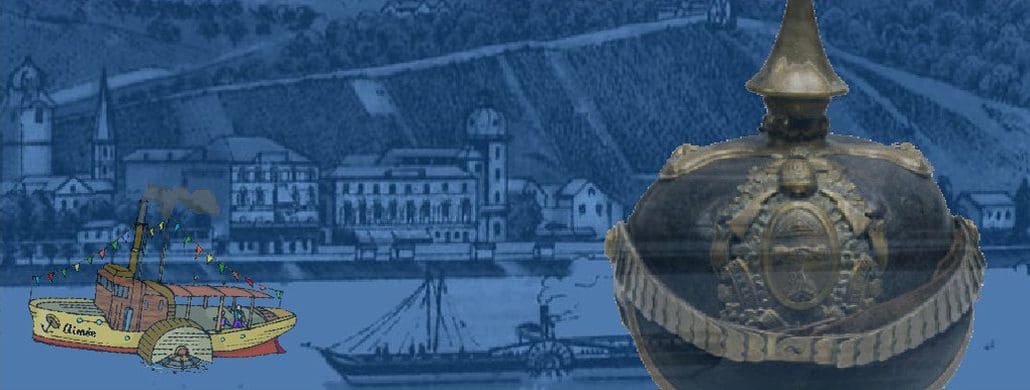
[Germany, August 1914] Mobilization was underway. Enthusiasm for the war swept away all other emotions, suspicion was growing, thus even friends and acquaintances became enemies.
In patriotic exuberance, countless people paraded through the streets, waving black-white-red flags of the Empire and shouting cheers.
“Germany, Germany above all!”
Foreign-sounding names were hastily germanized, even neighbors were denounced of being spies or enemy agents planning to contaminate the drinking water. And in between all that was a family with connections to Alsace-Lorraine who would rather donate their ship to the Red Cross than to the military!
It was hard to bear for Lottie, Susan and Marie. In deep mourning for her mother Sophie and fearing for her husband Matthias at the front as well as for her uncle Hans and Etienne on the “Aimée”, this flag-waving patriotism tore into Lottie’s heart like a dagger. Her mother was a victim of war before the first shot. Often Lottie’s thoughts wandered her father Andras and her brother Joscha in Austria-Hungary, he too was of military age. She knew that the Austro-Hungarian army was in bad shape. Yet, the military leaders in Vienna did not expect a long war, the Serbs would be finished quickly. However, Russia and Serbia recently had fought modern wars, whereas Austria-Hungary was in poor shape.
Bad news
Hans and Etienne had been away for days already, and still Susan had no news of them, and fear for her busband and Hans overwhelmed her. A few days later, an elder officer stood in the doorway. Susan knew him; he had been stationed in Bonn and had cruised the Rhine with them on the “Aimée.” She sensed immediately that he brought bad news.
Hans and Étienne had taken their ship to Coblenz, Mainz, and Wiesbaden. But just before Strasbourg the “Aimée” had to stop briefly to let another ship pass. In the wartime situation on both sides of the Rhine, many saw an enemy in anyone they did not know. Apparently, some had believed that the ship with the French name was to be handed over to the enemy, whomsoever they considered the enemy. Hans had shouted that they would donate the “Aimée” to the Red Cross. Then a shot had been fired from somewhere, and Hans was killed. Étienne had rushed to him, and another bullet had wounded him lethally.
“My deepest condolences,” the officer said. “I do not wish to urge you, but you better bring them home soon. I appreciate your intention very much, but we are at war. Many people are no longer themselves, they want to see as many enemies dead as possible.”
Farewell to Hans and Étienne
Upon hearing the news, Joscha Csabany had taken a night train from Austria-Hungary to the Rhineland, to be with his family and friends. He was wearing the gray uniform of an Austro-Hungarian captain. With Emil Bergmann, he set off for Strasbourg. Their uniforms and his diplomatic passport helped to transfer the mortal remains of Hans and Étienne quickly and without questions to their homeland. They were quietly buried.
For days Susan was stony-faced, she did not speak, sleep, nor eat, and she had no tears. Although she was sitting in the midst of them, she seemed to be no longer a part of life. Her daughter Marie, her parents Lena and Emil, Lottie, and her lifelong friend Jacob were always around her, as if to give Susan strength by their loving presence. They knew that words could not comfort her. At last, Susan spoke: “I should have been with him.” “Then Marie would be an orphan now,” her father said softly, “Étienne would not have wanted that.”
Captain Joscha Csabany
Soon Joscha had to leave. “They’ve drafted you,” Lottie said to her brother, “but at least you do not have to go to the front.” “How could I ever be glad about staying behind,” Joscha replied sadly, “my heart goes out to the hundreds of thousands of poor fellows out there. For our peasants, mobilization in the midst of the harvest is a terrible disaster. Everything is now under military administration, and they need us more urgently elsewhere.
Our family estate in Hungary will be back area, we shall support our troops and the people around us as best we can. We will run our house as a convalescent home and a field post station, and outside there is a training area. We will mobilize all the tailoring companies with whom Mama has worked together, they have to produce uniforms now. There is a shortage of everything at the back and front.”
He said good-bye to all of them. “I am here for you, whatever may come,” he told Susan and Marie, “we all are, you’re not alone.”
Helping on the home front
Marie hugged him spontaneously. “But you’re alone in Hungary,” she said. Joscha was touched. “Many men are gone, almost every family had to let a husband, son, brother, or fiancé go to war,” he said, “they all are praying and hoping that their loved ones will come back home safely. Only the elderly, the women, the children are there to do the work at home, and papa in Vienna and me. I just have to help, and I’m not quite so alone when you write to me.”
“We will also help,” Marie said bravely, “the Fatherland Women’s Association and other help committees now need everyone who has logistical skills. Jacob and I have already made plans, we will run a soup kitchen in the ‘Stübchen’.” The elderly gentleman nodded sadly. “Rest assured, young Count,” he said, “I’ll do as best I can.” Now Susan smiled through her tears. “You don’t have to do it all alone, Jacob,” she said, “I’ll do the cooking.”
After a last hug for family and friends, Joscha made his way back to Hungary.

Be the first to comment